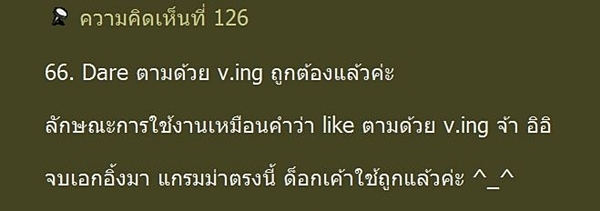 |
"Depending on its sense, the verb dare sometimes behaves like an auxiliary verb (such as can or may) and sometimes like a main verb (such as want or try). When used as an auxiliary verb, dare does not change to agree with its subject: He dare not do that again. It also does not combine with 'do' in questions, negations, or certain other constructions: Dare we tell her the truth? I dare not mention their names. Finally, it does not take 'to' before the verb that follows it: If you dare breathe a word about it, Ill never speak to you again.
"When used as a main verb, dare does agree with its subject (If he dares to show up at her house Ill be surprised), and it does combine with 'to' (Did anyone dare to admit it?). It may optionally take 'to' before the verb following it: No one dares (or dares to) speak freely about the political situation.
"The auxiliary forms differ subtly in meaning from the main verb forms in that they emphasize the attitude or involvement of the speaker while the main verb forms present a more objective situation. Thus 'How dare she take the exam without ever once coming to class?' expresses indignation at the students action, whereas 'How did she dare to take the exam without ever once coming to class?' is a genuine request for information.
When dare is used as a transitive verb meaning challenge, only main verb forms are possible and to is required: Anyone who dares (not dare) him to attempt (not just attempt) it will be sorry."
คัดลอกมาจาก http://www.usingenglish.com/forum/ask-teacher/17319-after-dare.html
สรุปว่า dare สามารถเป็นได้ทั้งกริยาช่วย (เช่น can หรือ may) และกริยาแท้
ถ้าใช้ในรูปกริยาช่วย dare จะต้องไม่ผันตามประธาน (He dare not argue with his boss. หรือ How dare he touch me?) และไม่ต้องตามด้วย to (I dare say he doesn't know what he's doing.)
(มีการเถียงกันว่าจริงๆ ต้องเป็น dare say หรือ daresay แต่ทั้งนี้ทั้งนั้นไม่มีการตามด้วย v+ing เด็ดขาด)
ถ้าใช้ในรูปกริยาแท้ dare ต้องผันตามประธานและตามด้วย to (She dares to speak out against her boss.)
การใช้ dare ในรูปกริยาช่วยจะเน้นที่ทัศนคติหรือความเกี่ยวข้องของผู้พูด แต่ถ้าใช้ในรูปกริยาแท้จะเป็นการพูดเฉยๆ เพื่อให้ข้อมูลหรือถามข้อมูลมากกว่า
สุดท้าย dare ในรูปของสกรรมกริยา (มีกรรมตามหลัง) จะแปลว่า "ความท้าทาย" ใช้ในรูปของกริยาแท้ที่ต้องตามด้วย to ดูตัวอย่างประโยคตามย่อหน้าสุดท้ายที่คัดลอกมาข้างบน
ไม่ใช่ครู ไม่ใช่ด็อกเตอร์ ไม่ได้เอกอังกฤษ เป็นแค่คนธรรมดา
| จากคุณ |
:
Quiet Spectral 
|
| เขียนเมื่อ |
:
31 ส.ค. 55 03:23:34
|
|
|
|
 |





